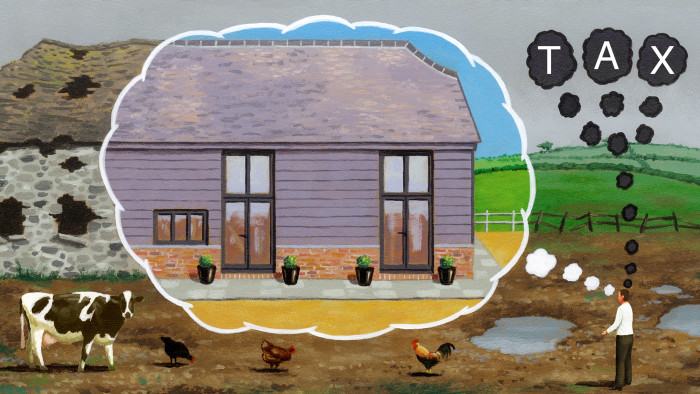Do I need to tell the taxman about my barn conversion?

Simply sign up to the Property sector myFT Digest -- delivered directly to your inbox.
A barn-storming idea
We have a barn on our land which we are planning to convert into a holiday let. We have planning permission, but will we need to tell the taxman?
Ultimately, yes. While simply converting an outbuilding or barn from its existing use to residential does not in itself require you to notify HM Revenue & Customs, what will require notification is the business element that will eventually follow from renting the barn.
Who said anything about a business? I was just planning on letting it out to friends and family, and their friends perhaps.
Whether a registered business or not, assuming the house, garden and the barn are owned by you, the rental income received will need to be declared as part of your individual tax return. This will be the case irrespective of what income you may receive from other sources, whether that be employment, self-employment or from investments.
But I thought the government introduced a scheme that allowed you to “rent a room” without having to pay tax?
You’re right. There is a “rent a room” tax-free allowance of £7,500 a year, and it is possible that occasional rental of a holiday barn might qualify for this. But if the income exceeds the £7,500 annual allowance, a tax return would need to be submitted to claim the relief.
OK, cards on the table time: what if we just don’t tell HMRC?
Failure to notify could see penalties being imposed on you along with any interest charged on the assertions made by HMRC. The onus would be on you to prove otherwise.
This is beginning to sound quite complicated.
I’m afraid so — one cannot avoid the taxman. You may wish to explore transferring the barn into a different ownership structure before starting the project but whatever you do will come with reporting obligations and an annual tax return. You are likely to need advice tailored to your own circumstances — what is right for one person may not necessarily be right for another.
Angus Williams is a partner and head of residential property, farms and estates at Royds Withy King
Saddled with ponies
I live in rural Suffolk. Last week two black and white ponies mysteriously appeared in my field at the back of our house. I have no idea who owns them. How can I get rid of them?
It sounds like this is a classic case of fly-grazing. Fly-grazing is the deliberate grazing of horses on land without the consent of the land owner.
Thankfully for you, the Control of Horses Act 2015 has made it much easier for landowners in England to tackle fly-grazing. Under the legislation, you can detain the horses for four days (not including weekends, Good Friday or Christmas Day) and if the owner does not come forward during this time you can have them removed.
That sounds good. How do I do that?
The first thing you should do is notify the local police and obtain an incident number. You may also wish to put up an abandonment notice on your land stating your intention to remove the horses (examples are available on the internet). The horses may then disappear!
You should be aware, though, that while the horses are on your land you are legally responsible for their welfare. With that in mind, you should offer the horses fresh water and consider moving them to an area where they can safely graze, if necessary.
If the owner comes forward, your right to detain the horses will come to an end but you do not have to release the horses until the owner pays the costs you incurred in detaining them. It is therefore a good idea to keep a record of all your actions and costs as evidence.
What if the owner is not found?
If the owner is not found, then after four days you are free to dispose of the horses as you think fit and there are specialist horse bailiffs who can remove the horses for you if you do not feel comfortable doing so.
As it is a legal requirement for every horse to have a passport and to be microchipped it will not be possible to sell the horses without their passports. For more information you should contact the Department for Environment, Food and Rural Affairs (Defra) which will be able to assist.
Katy Tydeman is an associate at Farrer & Co
The legal issues discussed in this column refer to England and Wales. Scenarios have been compiled for illustrative purposes only
Follow @FTProperty on Twitter to find out about our latest stories first. Subscribe to FT Life on YouTube for the latest FT Weekend videos
Comments